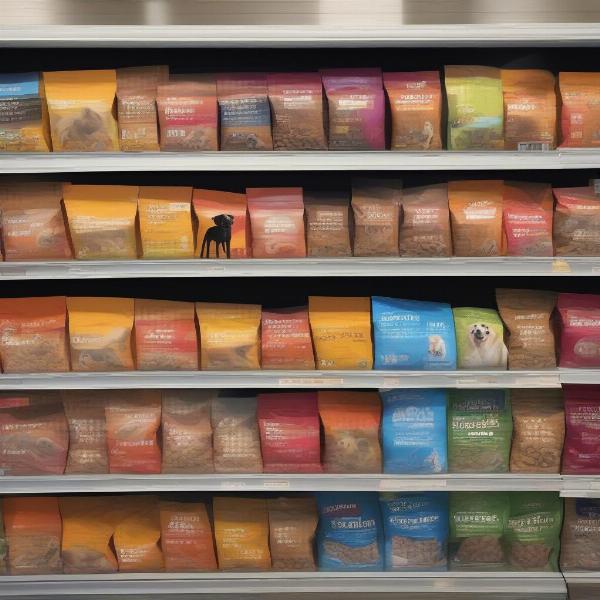Choosing the right dog food can feel overwhelming with the sheer variety available at pet supermarkets. From budget-friendly options to premium brands, navigating the aisles of pet supermarket dog food requires a discerning eye and an understanding of your dog’s individual needs. This guide will equip you with the knowledge you need to select the best pet supermarket dog food for your furry companion.
Decoding Dog Food Labels: What to Look For in Pet Supermarket Dog Food
 Decoding Dog Food Labels at the Pet Supermarket
Decoding Dog Food Labels at the Pet Supermarket
Understanding dog food labels is crucial. The first ingredient listed is the most prevalent by weight. Look for whole meat sources like chicken, beef, or lamb, rather than by-products. Avoid artificial colors, flavors, and preservatives. The guaranteed analysis provides minimum percentages of protein, fat, fiber, and moisture. Check the AAFCO statement to ensure the food meets nutritional requirements for your dog’s life stage (puppy, adult, senior).
Matching Your Dog’s Needs: Breed, Age, and Activity Level
Different dogs have different nutritional needs. Large breed puppies require specific formulations to support healthy bone growth, while senior dogs benefit from lower calorie, joint-supporting formulas. Active dogs need higher calorie, protein-rich diets compared to less active dogs. Consult your veterinarian or a qualified canine nutritionist for personalized recommendations.
Addressing Specific Dietary Needs: Allergies and Sensitivities in Pet Supermarket Dog Food
Just like humans, some dogs have food allergies or sensitivities. Common allergens include beef, chicken, wheat, corn, and soy. If your dog experiences digestive upset, skin issues, or excessive itching, consider hypoallergenic or limited ingredient diets. These specialized formulas available in pet supermarkets minimize the risk of triggering allergic reactions.
Budget-Friendly vs. Premium: Navigating Pet Supermarket Dog Food Options
Pet supermarket dog food comes in a wide range of prices. While premium brands often boast higher quality ingredients and specialized formulas, budget-friendly options can still provide adequate nutrition if you choose carefully. Focus on the ingredient list and guaranteed analysis, not just the price tag.
Is Grain-Free Dog Food a Good Choice?
The popularity of grain-free dog food has surged in recent years. While some dogs thrive on grain-free diets, it’s not necessarily better for all dogs. Consult your veterinarian before switching to a grain-free diet, especially if your dog has any underlying health conditions.
Understanding the Potential Risks of Grain-Free Diets
Recent research has linked grain-free diets, particularly those high in legumes, to dilated cardiomyopathy (DCM) in some dogs. More research is needed to fully understand this link, but it’s important to be aware of the potential risks and discuss them with your veterinarian.
Making the Switch: Introducing New Pet Supermarket Dog Food Gradually
When introducing a new dog food, do so gradually over several days to avoid digestive upset. Start by mixing a small amount of the new food with the old food, gradually increasing the proportion of new food until the transition is complete.
Conclusion: Choosing the Best Pet Supermarket Dog Food for Your Canine Companion
Choosing the right pet supermarket dog food requires careful consideration of your dog’s individual needs, including breed, age, activity level, and any existing health conditions. By understanding dog food labels, consulting with your veterinarian, and making the switch gradually, you can ensure your furry friend receives the optimal nutrition they need to thrive. Don’t hesitate to ask questions at the pet supermarket and seek professional guidance when needed.
FAQ:
- What is the best dog food brand at the pet supermarket? There’s no single “best” brand, as the ideal choice depends on your dog’s individual needs.
- How can I tell if my dog is allergic to their food? Look for symptoms like itching, skin irritation, vomiting, and diarrhea.
- Should I feed my dog wet food or dry food? Both have their pros and cons. Consult your vet for advice based on your dog’s specific needs.
- How often should I feed my dog? This depends on their age, breed, and activity level.
- Can I give my dog human food? Some human foods are safe for dogs, while others are toxic. Research carefully before sharing.
- What should I look for in a puppy food? Look for a formula specifically designed for puppies, with adequate protein and calcium for growth.
- How do I transition my dog to senior food? Gradually mix the senior food with their current food over several days.
ILM Dog is a leading international website dedicated to providing expert advice on all aspects of dog care and breeding. From choosing the right breed to understanding your dog’s nutritional needs, we offer a wealth of reliable, practical information for both new and experienced dog owners. Our expertise covers dog breeds and selection, health and medical care, training and behavior, nutrition and feeding, grooming and hygiene, exercise and activities, puppy care, senior dog care, traveling with your dog, and product & accessories. Contact us at [email protected] or +44 20-3965-8624. ILM Dog is here to help you navigate the world of dog ownership with confidence.